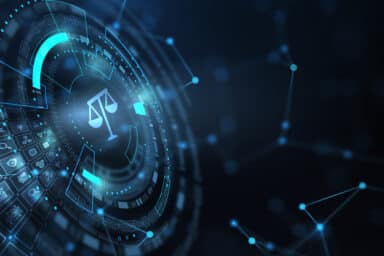AI Lawyer: Best Legal AI Advice for Your Firm

Artificial Intelligence (AI) has become commonplace in our society. If you’ve ever said, “Hey Siri, what’s the weather like outside?” or “Alexa, set a timer.”—you’ve used AI. AI is everywhere, from the facial recognition that unlocks your phone to tracking your DoorDash delivery. It’s also made its mark on the tech community with chatbots, predictive algorithms, and automated systems.
AI has even worked its way into lawsuits. Former Google engineer, Blake Lemoine, recently claimed that an unreleased AI system created at Google had become sentient. There are even reports that this sentient system may have requested legal representation.
So, how does AI fit into law? In this article, we’ll cover:
- The basics of AI
- How lawyers can use legal AI
- The benefits of using AI in law firms
- The best legal tools
What is AI?
Oracle, an international computer technology corporation, defines AI as “systems or machines that mimic human intelligence to perform tasks and can iteratively improve themselves based on the information they collect.” Generally speaking, AI systems work by taking in data, analyzing it, and using it to identify correlations and create predictions.
AI application is often broken down into four categories:
- Expert systems – A computer system that mimics the ability of human decision-making and uses a vast amount of data to solve complex problems
- Speech recognition – Intakes human speech via analog and converts it into a digital form, which can be used for speech analysis and transcription
- Machine vision – Uses image processing to take in and analyze large amounts of data and information
- Natural language processing (NLP) – A computer system with the ability to interpret written and spoken language, can be used to analyze contracts and flag problematic sections
Can Lawyers Use AI?

The short answer is yes. Becoming an AI lawyer simplifies and streamlines daily tasks and job processes, and overall case management. A few practical uses of legal AI include:
- Transcribing documents – Save your team tedious hours typing out statements and documents. AI-based transcription can have it done in seconds.
- Conducting legal research – With intelligent legal research, attorneys can conduct automated searches through catalogs of case law and statutes in seconds. This is work that would typically take days to complete. Legal AI can also be used for legal analysis to compare cases and look for patterns.
- Issuing risk assessment – AI-powered processes can review information in real-time, enabling attorneys to assess risks and advise clients with data-backed information.
Though AI can aid lawyers in their daily tasks, it won’t replace legal professionals. There are elements of human judgment and rationale in law that an AI system can’t replicate.
Is AI Law Ethical?
Attorneys need to follow ethical standards when using legal AI. AI can raise concerns about data privacy, information security, liability, and third-party sharing.
AI data can also easily be embedded with biased decision-making. This is due to human bias and error since people create legal AI and the data that runs it. The American Bar Association Journal (ABA Journal) states that “there can be no unbiased AI System. If an organization is designing or using AI systems to make decisions that could potentially be discriminatory under law, attorneys should be involved in the development process alongside data scientists.”
Before using AI in law firms, address all ethical issues and compliance standards. Look for bias, address security concerns, review data privacy rulings, and always ensure that you comply with your local jurisdiction’s standards regarding AI systems in law firms. The ABA Journal recommends that lawyers “have some basic technical knowledge” about AI before advising clients about legal compliance.
Three Benefits of Legal AI

Legal AI can streamline processes, increase efficiency, and even help you gain more clients. The benefits of using AI in law include:
1. Saving time – AI can analyze information faster and more thoroughly than humans can. Lawyers can utilize legal AI to search data, conduct legal research, and analyze contracts or other documents—saving them and their staff hours of tedious work. This allows lawyers to focus on billable tasks that will make the firm money.
2. Higher-quality work by limiting human error – Content produced or reviewed by intelligent software eliminates errors. People are imperfect, and even the best of us get tired and distracted. This can lead to a misspelled word, missed data, or a contract filled out incorrectly. AI lawyers can limit, if not eliminate, those errors and produce higher-quality work.
3. Improved client relationships – AI-driven processes can help to free up legal professionals’ time and allow them to focus on clients. With less of their day taken up by minutiae administrative tasks and tedious research, attorneys can use that time to engage with clients and create a more satisfying, client-centered experience.
For example, legal professionals can utilize AI chatbots to answer questions on their websites. This ensures that clients get quick and accurate responses and takes no time out of a lawyer’s busy day.
Best AI Tools for Law Firms
Effective legal AI tools can be a massive time saver for legal professionals. AI can reduce error, increase productivity, enforce processes, assess risk, and better serve legal clients as our legal technology improves. It can serve as your personal virtual legal assistant.
Many AI systems and AI chatbots can integrate with case management software, so all work is managed and documented under one system. With MyCase, you can boost client intake, automate workflows and calendar events, improve legal invoicing, and more.
Try MyCase risk-free with a 10-day free trial. There is no commitment, and you are free to cancel anytime.


